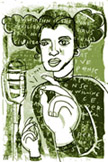
Out Loud: Preparing for a Poetry Read-Aloud
Developed by Sandy Scragg, New York City, 2002
lessons | video | poems | resources
Lesson 2: Reading Out Loud--Poetry & Oral Tradition
Instructional Objectives:
1) Students will be able to recognize the connection between African oral tradition and the culture of poetry readings/poetry slams.
2) Students will realize why poetry readings continue today and the rich tradition behind them.
Time Required: (2) 45-minute class sessions
Materials/Resources Required: Online article--The African oral tradition & its impact on today's storytelling, poetry & music and Online databases of urban legends: 1) snopes.com both debunks and confirms urban legends surrounding September 11th, and 2) urbanlegends.com discusses urban legends spread primarily through email.
Vocabulary & Key Concepts: myth, legend, oratory, folk tale/song, oral tradition
Procedures & Activities:
1) Play a version of the game "telephone" in class. Ask one student to be the recorder. Have students stand in a long line, with the recorder standing at one end, and you on the other. Pass an entire sentence along the "telephone wire" of the class. Pass along 3-4 words at a time. Have the recorder write down what he's told verbatim. Chances are, the original version will be markedly different from the original.
2) Ask students to discuss what happened. What can we say about information that's spread via word-of-mouth? (sometimes, it can be unreliable.)
3) Ask students what an "urban legend" is. Ask for a definition and some examples of some urban legends they have heard.
2) Direct students to either of the two urban legends web sites above and try to prove or disprove some of the legends they've just discussed.
3) Have some students detail their results: were the stories true or false? Were they able to verify the legends at all?
4) Ask how urban legends are spread (they'll tell you either word-of-mouth or email, not ever officially published). Explain that urban legends are examples of a modern form of oral tradition. Explain that poetry readings are also.
4) Direct students to the African Oral Tradition website listed above. Ask students to read the article for homework.
5) The next day, ask students to list the different uses of oral tradition as described in the article (expression, spread myth & legend, hand down important information from generation to generation, social commentary, oratory, social protest, and survival). Make sure to distinguish that myth & legend is only purpose of oral tradition.
6) Divide students into groups. Have them brainstorm how they think oral tradition is still seen in society today. Have them come up with as many examples as they can.
7) Solicit examples from each group and list them on the board (examples: in poetry slams, in rap music, in protest songs, in gospel music, in urban legends, in rumor and gossip)
8) Focus on responses that relate to poetry readings & poetry slams. Ask if students can wrap up and explain the connection between poetry readings and the history of African oral tradition (possible responses: slave songs are related to today's hip-hop poetry that comments on poor social conditions, poems can tell a story or impart important information, poems are usually forms of self-expression, eg).
lessons | video | poems | resources